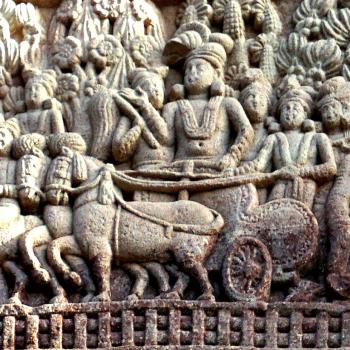Lectionary Reflections
Micah 5:2-5a
December 23, 2012
The text for this fourth Sunday in Advent is on the surface quite un-Micah-like. It could be said that Micah is among the angriest of the prophets of the Hebrew Bible. He is apparently a rural farmer, furious at the depredations of folk of the big city, calling them thieves (2:2), false preachers, more interested in lighter problems like drunkenness while injustice is rampant in the city (2:11), greedy for wealth, who "hate good and love evil, both tearing and eating the flesh of the poor, breaking their bones in pieces, chopping them up like meat for the kettle, like flesh in a cauldron" (3:2-3). One can only hope the prophet is being merely metaphorical here!
These are people, says Micah, who "cry 'peace' when they have something to eat, but declare war against those who put nothing in their mouths" (3:5). This is a hilarious and bitter picture of fat cats, satisfied and indolent, murmuring "peace, peace" when they are sated with rich food, but who turn their fury on those who refuse to keep them comfortable and full. Such a portrait could be made modern by picturing wealthy people who are silent and comfortable as long as those with less do not make any complaint. But when the poor ones demand their fair share, those with more become very angry and uncomfortable with the ensuing chaos and confusion.
As you can see, Micah is no one to be trifled with, and probably no one to invite to your next dinner party; he holds every chance of making the party both memorable and disastrous as he upbraids the guests and you with angry demands for justice.
So, what are we to make of the rather different words of 5:2 and following?
Micah Changes Tone and Predicts the Coming Christ
The oracle of one arising from one of the "little clans of Judah" appears in the middle of a longer prophecy concerning the eventual defeat of the enemies of Israel, most especially the forces of the Assyrians, the ultimate bad boys of the Middle East during the days of Micah, the middle of the 8th century B.C.E. The Assyrian threat is very real, resulting first in the Syro-Ephraimitic war in 738 B.C.E., when the northern kingdom of Israel joined with the Assyrians to threaten the southern kingdom of Judah, and then the utter destruction of the northern kingdom by the Assyrians in 722 B.C.E. and the continuous threats against southern Judah over the next twenty years. In chapter five, Micah promises an Assyrian defeat, culminating in a "remnant" of Israel finally saved by the power of YHWH.
And right in the midst of that promise for Israel comes the section that is assigned for the fourth Sunday in Advent, the Sunday that most closely precedes Christmas Day. It is more than obvious why the earliest Christian communities seized on this oracle from their Bible, the Hebrew testament, and claimed it as a prediction of the one they came to call Christ.
The opening of the section was what they heard most resonantly. "You, Bethlehem, Ephrathah, being a little Judean clan, from you shall come forth for me, one to rule in Israel, whose coming forth is from of old, from ancient days" (5:2; 5:1 in Hebrew). Of course, any mention of Bethlehem in the ears of Hebrews and later Jews would immediately bring to mind the greatest king of Israelite history, the mighty David who was born in the tiny village of Bethlehem and was chosen by the prophet Samuel as king, though he was the eighth and youngest child of the unknown chieftain, Jesse. By the time of Micah, David's tenure as king some 200 years before surely seemed to be "from of old, from ancient days." Micah here dreams of another David-like king who will defeat the Assyrians and bring Israel back to its days of glory before the YHWH who chose them as the people of God.
The early Christians took this Davidic promise and applied it to their Bethlehem-born Messiah, Jesus of Nazareth, thereby emphasizing his birth in Bethlehem and his direct connection to the older Bethlehemite king, David of Israel. And the rest of the passage added to their certainty that Micah was prefiguring the coming of Jesus. Verse 5:3 is somewhat vague, but whatever else it means, it surely refers to a woman giving birth: "Therefore, he shall establish them until the time when she who is in labor has brought forth, and the remnant of his kindred has returned to the people of Israel."
One thinks immediately of the parallel passage in Isaiah 7:14 where "the young woman shall conceive and bear a son, calling him Immanuel." The next verse of that oracle claims that the boy will "eat curds and honey by the time he knows how to refuse the evil and choose the good." And before even that happens—that is, the ability of the boy to know good from evil—"these two kings (Pekah and Remaliah), Ahaz, before whom you are in dread, will be destroyed" (Is. 7:16).





